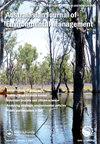Hot or not? Developing a spectrum of indicator-based assessments in approaching vulnerability to climate change
IF 1.5
4区 社会学
Q4 ENVIRONMENTAL STUDIES
Australasian Journal of Environmental Management
Pub Date : 2022-01-02
DOI:10.1080/14486563.2022.2034672
引用次数: 2
Abstract
ABSTRACT Vulnerability assessments to climate change are instruments to support the design of mitigation and adaptation strategies. They are relevant to cities or regions where the impacts may be significant and politicians are keen to avoid economic losses due to maladaptation or inefficient policy courses. Despite the relative simplicity of indicator-based assessments (IbAs), their reliability has been questioned due to their non-robustness and inconsistent outcomes due to changes in modelling assumptions. Nonetheless, politicians still require evidence-based tools to make decisions to signal adaptation and policy approaches. This article develops a range of IbAs through the Ordered WeightedAverage (OWA) approach to construct a decision space for policy-makers. The OWA incorporates the possibility of non-robustness and inconsistency, and improves our understanding about vulnerability. We take Auckland, New Zealand, as a case study and find that if policymakers are risk averse, policy focus is on minimising vulnerability to coastal inundation due to sea level rise. As policymakers ease risk aversion, focus switches to enhancing natural capital and ecosystem services. The OWA reveals the trade-offs prevalent in complex socio-ecological systems and coupled human-infrastructure systems. Therefore, it consolidates a knowledge base for decision-making, which could be adapted internationally and create knowledge spillover and exchange of expertise.热不热?制定一系列基于指标的评估,以应对气候变化的脆弱性
摘要气候变化脆弱性评估是支持制定缓解和适应战略的工具。它们与可能产生重大影响的城市或地区有关,政治家们热衷于避免因适应不良或政策过程效率低下而造成的经济损失。尽管基于指标的评估相对简单,但由于建模假设的变化,其不稳健性和结果不一致,其可靠性受到质疑。尽管如此,政治家们仍然需要循证工具来做出决定,以表明适应和政策方法。本文通过有序加权平均(OWA)方法开发了一系列IbA,为决策者构建决策空间。OWA包含了不健壮性和不一致性的可能性,并提高了我们对脆弱性的理解。我们以新西兰奥克兰为例研究,发现如果政策制定者规避风险,政策重点是最大限度地减少海平面上升导致的沿海洪水的脆弱性。随着政策制定者缓解风险规避,重点转向加强自然资本和生态系统服务。OWA揭示了复杂的社会生态系统和耦合的人类基础设施系统中普遍存在的权衡。因此,它巩固了决策的知识基础,可以在国际上进行调整,创造知识溢出和专业知识交流。
本文章由计算机程序翻译,如有差异,请以英文原文为准。
求助全文
约1分钟内获得全文
求助全文
来源期刊

Australasian Journal of Environmental Management
ENVIRONMENTAL STUDIES-
CiteScore
2.60
自引率
0.00%
发文量
16
 求助内容:
求助内容: 应助结果提醒方式:
应助结果提醒方式:


